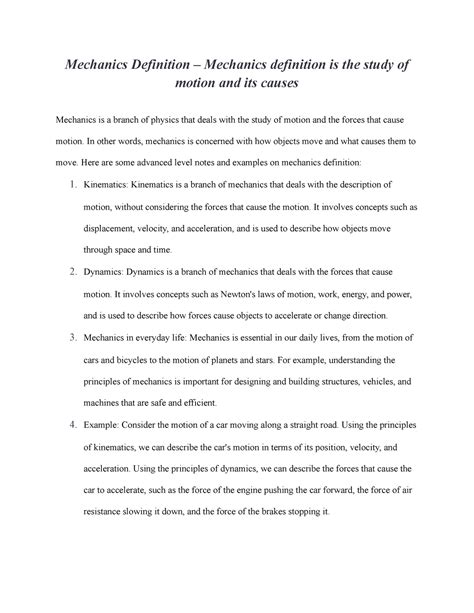Mechanics refers to the science of motion and the forces that cause it. It is a fundamental branch of physics that has applications in a wide range of fields, including engineering, manufacturing, and robotics.

Types of Mechanics
There are three main types of mechanics:
- Classical mechanics describes the motion of macroscopic objects, such as cars, planets, and airplanes. Its laws were first proposed by Sir Isaac Newton in the 17th century.
- Relativistic mechanics describes the motion of objects moving at speeds close to the speed of light. It was developed by Albert Einstein in the early 20th century.
- Quantum mechanics describes the motion of subatomic particles, such as electrons, protons, and neutrons. It was developed in the mid-20th century.
Laws of Motion
The three laws of motion are the foundation of classical mechanics. They state that:
- An object at rest stays at rest and an object in motion stays in motion with the same speed and in the same direction unless acted upon by an unbalanced force.
- The acceleration of an object as produced by a net force is directly proportional to the magnitude of the net force, in the same direction as the net force, and inversely proportional to the mass of the object.
- For every action, there is an equal and opposite reaction.
Applications of Mechanics
The principles of mechanics are used in a wide range of applications, including:
- Engineering: Mechanics is used to design and build structures, machines, and other devices.
- Manufacturing: Mechanics is used to create and assemble products.
- Robotics: Mechanics is used to design and control robots.
- Sports: Mechanics is used to analyze and improve athletic performance.
- Transportation: Mechanics is used to design and operate vehicles.
Importance of Mechanics
Mechanics is a fundamental science that is essential for our understanding of the world around us. It has applications in a wide range of fields and plays a vital role in our everyday lives.
What is the Difference Between Mechanics and Dynamics?
Mechanics is a broad field that includes both statics and dynamics. Statics is the study of objects at rest, while dynamics is the study of objects in motion.
What are the Basic Concepts of Mechanics?
The basic concepts of mechanics include:
- Position: The position of an object is its location in space.
- Velocity: The velocity of an object is its rate of change of position.
- Acceleration: The acceleration of an object is its rate of change of velocity.
- Force: A force is a push or pull that can change the motion of an object.
- Mass: The mass of an object is a measure of its resistance to changes in motion.
- Energy: Energy is the ability to do work.
How Can I Learn More About Mechanics?
There are many resources available to help you learn more about mechanics. You can find books, articles, and videos on the subject. You can also take courses in mechanics at many colleges and universities.
Conclusion
Mechanics is a fascinating and important field of study. It has applications in a wide range of fields and plays a vital role in our everyday lives. If you are interested in learning more about mechanics, there are many resources available to help you get started.
Additional Resources
- Mechanics on Wikipedia
- The Laws of Motion on PhysicsClassroom.com
- Mechanics on Khan Academy
